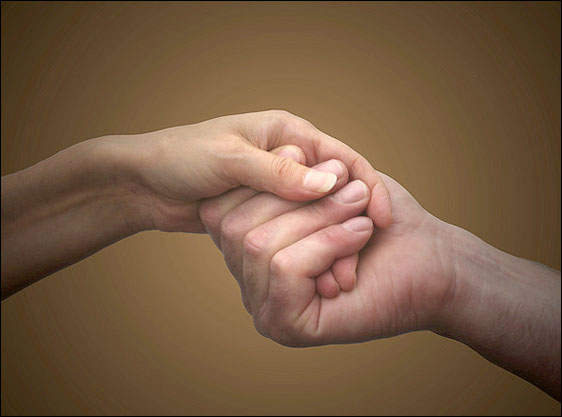
A humanist's guide to prayer
What would the prayer of a humanist sound like?
To a family member who was ill, to a colleague who was anxious or depressed, to a friend who was grieving a great loss, I could say: “I’ll pray for you.” And it meant I cared. It meant I would intercede with God on their behalf. And they took comfort in that. Perhaps that is the true power of prayer—that exchange of comfort. You are comforted by my gift of praying for you, and I am comforted that I can give you that gift.
But the value of the gift, it seemed to me, depended on there being someone to pray to, so I stopped praying. I stopped believing that there is a distinct divine being outside of me who is listening. And yet, I’ve sometimes wondered: Why should that keep me from praying? I desperately want to give that very real gift of caring and comfort, and I have come to believe that is possible—that what I can offer is the prayer of blessing.
Traditionally, blessings were invoked by persons of authority on those under their protection. Parents blessed children; tribal leaders blessed their heirs, and in so doing passed on to them the benefits of their own “blessed” state, which often included worldly success and numerous progeny. In religious traditions, these blessings, though invoked by the human pray-er, were believed to be bestowed by the god(s).
Conversely, humans blessed the god(s) by “bestowing” on them praise and thanksgiving, acknowledging their power and glory. The book of Psalms is full of such expressions of admiration and appreciation.
Yet, even apart from religious contexts, the concept and practice of blessing thrives. To bless someone is to thank them. To bless someone is to acknowledge their gifts, their power. It is this form of blessing that I believe can be a prayer.
So what would the prayer of a humanist sound like? To whom would it be addressed?
What might a humanist’s prayer of praise sound like? “What a good job you did on that project. I bless you for all the work you do for our community.” “What a wonderful dinner—here’s to the cook!”
What might a prayer of contrition sound like? “I’m sorry I lost my temper. You didn’t deserve that, and I’ll try not to do it again. Please forgive me.” “I know now I need professional help, and this time I’m going to get it. Today.”
What might a prayer of supplication—an attempt to provide help for someone in need—sound like? “I heard you weren’t feeling well. Will you let me bring dinner over?” “You must be so lonely now. How can I help?”
What might a prayer of thanksgiving sound like? “Dear Senator, thank you for voting for the same-sex marriage bill.” “Bless you, dear friend, for being there when I need you.”
So, perhaps it turns out we’ve been praying all along, with or without a god. One Jewish prayer book, The Complete Artscroll Siddur, tells us that “God knows our requirements without being reminded.” The purpose of prayer is to enable us to develop true perceptions of life. “Prayer is a process of self-evaluation . . . ; a process of removing oneself from the tumult of life to a little corner of truth, and refastening the bonds that tie one to the purpose of life.” If we perceive prayer as the process of connecting, will we not be prepared and motivated to bless?
In The Energy of Prayer, Thich Nhat Hanh says that when Buddhists pray, they are praying both to themselves and to what is outside themselves, that there is no distinction between the pray-er and the pray-ee—they are of the same substance. He says that when we practice mindful meditation and send our energy to someone who is in need, that transmission of energy is a form of prayer. “When love and compassion are present in us, and we send them outward, then that is truly prayer. [Further], in sending love outward, we may notice a change in our own heart.”
Our mind, Hanh says, “is a center that produces energy.” Using our mind, he claims, we can change the situation of the loved one we pray for; we can change the world. We do this by creating a real energy. “This,” he says, “is the most effective way of prayer.”
I don’t think you have to be a Buddhist to embrace the idea of prayer as energy. So perhaps it is possible, even for an atheist, to promise a friend in need, “I’ll pray for you,” and then deliver on that promise by sitting in meditation, mindfully sending helpful, healing energy to that friend.
But meditation isn’t the only way that healing, helping energy can be delivered. Sometimes it travels more directly: from our lips to someone else’s ear in the form of a blessing.
Remember the story in the book of Exodus in which God appears to Moses in the form of a burning bush? Moses asks, “Who are you? What is your name?” The answer comes back: “I am who I am.”
I am who I am. What if “god” is all that is? What if “god” is all who are?
Blessed be all that is! A prayerful version of Margaret Fuller’s “I accept the universe”? Blessed be all who are! The Universalist’s prayer of inclusion?
Perhaps this—simple as it is—could be our humanist prayer:
Bless all that is.
Bless all who are.
Amen.
This article appeared in the Spring 2013 issue of UU World (pages 19–20). Photograph © Nikki Zalewski/Fotolia.com. See sidebar for links to related resources.
Comments powered by Disqus






